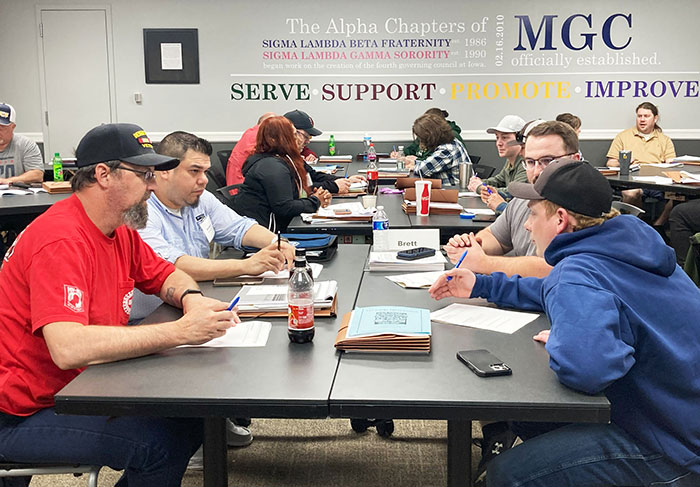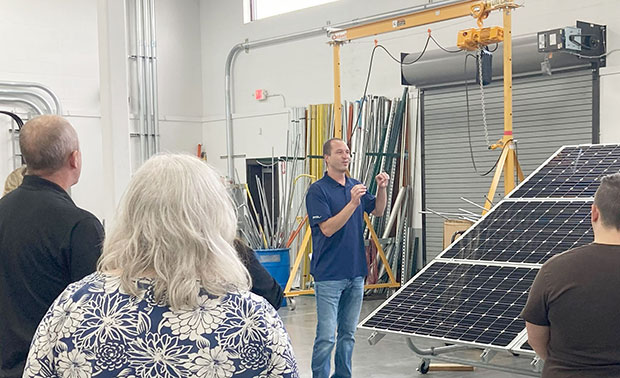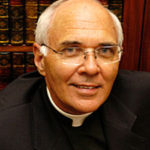
Adults take an Eastern Iowa IBEW Registered Apprenticeship Training Center class in the Iowa Memorial Union, located on the University of Iowa campus in Iowa City.
By Barb Arland-Fye
The Catholic Messenger
On Sept. 4, the U.S. will celebrate Labor Day, a 129-year-old federal holiday that pays tribute to the American worker. How are workers faring in 2023, as the nation moves toward a renewable energy economy? The U.S. Conference of Catholic Bishops believes that “the most effective way to build a just economy is to make decent work at decent wages available for those capable of working …” (https://tinyurl. com/2ytxu7em). The Catholic Messenger interviewed the director of the University of Iowa Labor Center and two labor leaders in southeast Iowa for their perspective on the well-being of Iowa workers.
- What are the most pressing concerns for Iowa workers today?
“Too many Iowans work every day and are still struggling to afford their family’s basic needs. Wages have stagnated for decades, even as corporate profits increased. All of our neighboring states except one have passed minimum wage increases, but ours has been frozen at $7.25 for 15 long years,” says Robin Clark-Bennett, director of the Labor Center.
“A 2022 report by Common Good Iowa found that 114,000 Iowa families with at least one full-time worker do not earn enough to meet a no-frills, basic needs budget, including 45% of single-parent working households. They are caring for our children, preparing our food, working in our healthcare facilities — all jobs we called ‘essential’ during the pandemic.”
“As we look at replacing jobs of the past, we want to make sure that they are high quality jobs paying fair wages,” says Ryan Drew, business representative for Operating Engineers Local 150, which represents 850 members from Clinton to Keokuk. The union invests a “tremendous amount of time” in training programs that respond to the changing technology, says Drew, who also serves as president of the Des Moines/Henry County Labor Council and the Southeast Iowa Building and Construction Trades Council.

“I want companies to make money. If they don’t make money, they can’t pay us a good wage,” says Lorri Walker, president of Steelworkers Local 444L in Keokuk. She represents union members at Henninges Automotive in Keokuk, which employs around 400 workers. The company is experiencing increased demand for its automotive sealing products because of growth in electric vehicle (EV) production. The work provides good wages and benefits and kept employees on the job during the pandemic, she said.
- What else concerns workers?
“Workplace safety and health continues to be a pressing concern,” Clark-Bennett said. “The pandemic reminded us all what working-class communities have known for a long time — that workplace health and public health cannot be separated. When workers face unsafe conditions on the job, whether from exposure to illness or injury, it has a profound effect on their families and communities. Our current construction boom provides welcome job opportunities, but this is also one of the deadliest industries when contractors cut corners on safety. We’ve heard heartbreaking stories this summer about construction workers, including an immigrant father and even a 16-year-old boy, who suffered severe injuries on Iowa construction sites.”
Another concern is wage theft, “a hidden crime wave” in which employers refuse to pay workers some or all of the wages legally owed to them, says Clark-Bennett. Examples include failing to pay workers for overtime, requiring them to clock out and keep working, making unlawful deductions from workers’ pay or failing to pay them for completed work. “This is particularly a problem in restaurants, hotels, and construction.”
- How is the Labor Center responding to the evolving green economy and its impact on workers?

People learn about solar panels and their installation during a green jobs tour at the IBEW JATC facility in Cedar Rapids, Iowa.
“We’ve been proud to help conduct research, lead workshops and host conferences with members of a new statewide network called the Iowa BlueGreen Alliance. This alliance began two years ago when the Iowa Federation of Labor, the Labor Center, and the Environmental Law and Policy Center began to convene statewide meetings with over 40 labor and environmental organizations to find common ground,” Clark-Bennett said.
The BlueGreen Alliance, a national labor and environmental network, “rejects the idea that we have to choose between good jobs and a livable planet — we can and must have both. Failure on either issue puts the other in jeopardy,” Clark-Bennett said. “For example, if utility-scale solar projects are built with out-of-state temporary agencies, cut costs on worker safety and undercut area wages for local workers, it weakens public support and exacerbates inequality. When renewable energy infrastructure projects create new, high-quality jobs with safety, living wages, pensions, health insurance, and Registered Apprenticeship training for our young workers, we can advance climate action and strengthen our local economies all at once,” she added.
Clark-Bennett and Drew point to the federal Inflation Reduction Act (IRA), passed last year, as an important tool in leveling the playing field. IRA “invests billions of dollars in renewable energy infrastructure, expansion of the electrical grid, energy efficiency upgrades, and U.S. manufacturing of clean energy products,” Clark-Bennett said. “It includes strong incentives for building projects with quality labor standards, such as the prevailing wage (a higher construction minimum wage), use of Registered Apprenticeship training programs, and Project Labor Agreements…. The IRA, as well as the Bi-Partisan Infrastructure Bill, can help support infrastructure upgrades and good jobs in Iowa communities — two priorities that are urgently needed in many of our rural communities.”

Drew sees the benefits of the IRA as the workers he represents begin work on a solar farm project in Lee County and look forward to working on a solar farm project in Clinton County. IRA tax incentives ensure job opportunities for local workers and apprentices. He also encourages the public to attend public hearings in their communities regarding construction projects and to advocate for fair wages that support workers and the community. “Corporations will have to spend more of the money they’ve been putting in their pockets to do the right thing,” says Walker. “Pay to make it a safe globe for all.”
“Today, we face historic threats and challenges — to our democracy, economic opportunities, and climate sustainability,” Clark-Bennett said. “But it is also a moment of historic opportunity to regroup and build a brighter future for our children. We at the Labor Center stand ready to provide research and educational support as our communities grapple with these important issues.”











